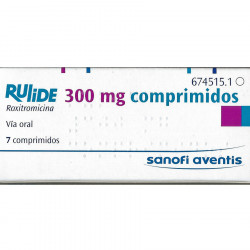Rulide D (roxithromycin) Coupons, Discounts & Cost
Rulide D is a semisynthetic antibiotic that belongs to the class of drugs known as macrolides. One way to save money on the Rulide D retail cost regardless of income and insurance status is to use Rulide D coupons or discount cards from RXCoupons. Use this Roxithromycin coupon at this online pharmacy and receive up to 75% off the sale price.
What do I need to know about Rulide D?
Rulide D is a semisynthetic antibiotic that belongs to the class of drugs known as macrolides. Its active ingredient is roxithromycin.
Rulide D indications: infections of the respiratory tract (sinusitis, tonsillitis, acute pharyngitis, bronchitis, pneumonia), bacterial infections in chronic obstructive pulmonary diseases, infections in odontology, genital infections (with the exception of gonorrhea), including cervicovaginitis and urethritis, infections of the skin and soft tissues.
What should I discuss with my doctor before taking Rulide D?
Do not take Rulide D in the following situations: - Combination therapy with ergot alkaloids (ergotamine and dihydroergotamine), cisapride, colchicine; - Glucose-galactose malabsorption; - Children up to 4 years old and weighing up to 40 kg; - Pregnancy and lactation; - Hypersensitivity to Rulide D components or other macrolides.
Use with caution: severe renal failure, myasthenia gravis, cardiac rhythm disturbances (bradycardia, hypomagnesemia or hypokalemia), combination therapy with drugs that can cause ventricular rhythm disturbances, elderly age.
How should I use Rulide D?
The drug should be taken before meals: swallow tablets whole and drink plenty of water.
Adults and children with a body weight of more than 40 kg: 1 tablet 2 times a day (at intervals of 12 hours). Adults can take 2 tablets once a day.
Patients with hepatic insufficiency should take 1 tablet once a day. The duration of treatment is associated with the type of infection, the activity of the pathogen and the severity of the disease.
What are the possible side effects of Rulide D?
The following side effects were found during Rulide D therapy: dizziness, headache, nausea, vomiting, severe abdominal pain, diarrhea, hallucinations.
Skin disorders and allergic reactions: redness, skin rash, hives, erythema multiforme, urticaria, weakness, angioedema, toxic epidermal necrolysis, Stevens-Johnson syndrome; rarely - anaphylactic shock.
Gastrointestinal tract: abdominal pain, nausea, vomiting, diarrhea (with blood in some cases); rarely - pancreatitis, pseudomembranous colitis.
Central nervous system: paresthesia, headache, dizziness.
Respiratory system: bronchospasm.
Liver: elevated liver enzymes, cholestatic hepatitis, jaundice.
Blood and lymphatic system: thrombocytopenia, neutropenia, agranulocytosis, eosinophilia.
Other: superinfections, confusion, hallucinations, tinnitus, temporary hearing loss.
Rulide D precautionary measures
Patients with hepatic insufficiency should be monitored for liver function during treatment.
The drug should be immediately discontinued if pseudomembranous colitis is suspected.
Care must be taken when driving during treatment. You should refrain from potentially dangerous activities in case of certain side effects (for example, dizziness, confusion, etc.).
Combination therapy with the following drugs is contraindicated: - Ergot alkaloids (dihydroergotamine and ergotamine); - Colchicine, cisapride.
Simultaneous application is not recommended: - Dopamine receptor agonists - ergot alkaloids (such as cabergoline, bromocriptine, pergolide, lisuride): signs of overdose may appear; - Terfenadine therapy can lead to severe ventricular arrhythmias; - Astemizole, pimozide: these drugs may cause heart rhythm disturbances.
Use with caution: - Cyclosporine: it is necessary to monitor the level of cyclosporine and the functional state of the kidneys); - Atorvastatin, simvastatin: the risk of side effects increases, including rhabdomyolysis (drugs should be used at lower doses); - Rifabutin, warfarin and certain anticoagulants; - Digoxin and other cardiac glycosides: there is the risk of cardiac glycoside intoxication (dizziness, headache, diarrhea, nausea, vomiting, heart rhythm disorders); - Drugs that can cause prolongation of the QT interval and promote ventricular arrhythmias, certain antiarrhythmic drugs (including dronedarone, bepridil, sotalol, amiodarone), amisulpride, citalopram, domperidone, dofetilide, levomepromazine, droperidol, haloperidol, escitalopram, quinidine, sulpiride, sultopride, pipothiazine, sertindole, lumefantrine, toremifene, methadone, tiapride, disopyramide.

